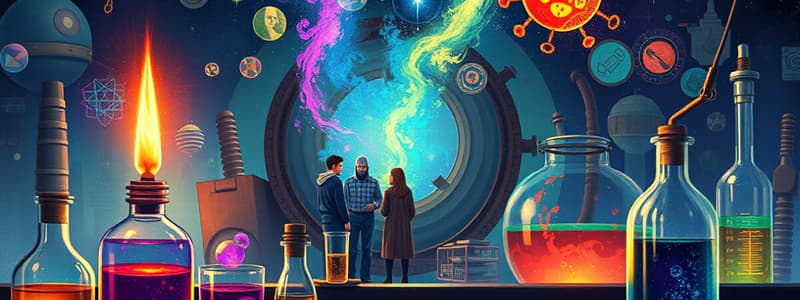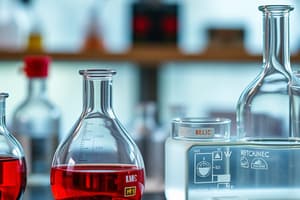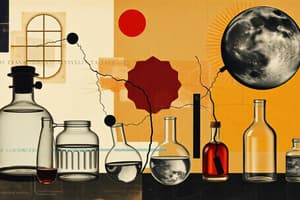Podcast
Questions and Answers
What is the first step of the scientific method?
What is the first step of the scientific method?
- Observation and analyzation (correct)
- Hypothesis
- Research
- Question
In the scientific method, the dependent variable is the variable that is changed by the experimenter.
In the scientific method, the dependent variable is the variable that is changed by the experimenter.
False (B)
What is a hypothesis?
What is a hypothesis?
An educated prediction about the outcome of an experiment.
Always add acid to ______, not the other way around.
Always add acid to ______, not the other way around.
Match the following types of observations to their definitions:
Match the following types of observations to their definitions:
Which of the following is considered a safety rule in the laboratory?
Which of the following is considered a safety rule in the laboratory?
The ______ variable is impacted by the changes made to the independent variable.
The ______ variable is impacted by the changes made to the independent variable.
A control group is essential in every experiment.
A control group is essential in every experiment.
Name one piece of lab equipment used to measure liquid volume.
Name one piece of lab equipment used to measure liquid volume.
What should you do if you smell harmful fumes in the lab?
What should you do if you smell harmful fumes in the lab?
Flashcards are hidden until you start studying
Study Notes
Scientific Method Overview
- A systematic approach utilized by scientists to gather information and solve problems relating to the natural world.
Steps of the Scientific Method
- Observation and Analyzation: Initial gathering of data through sensory experience.
- Question: Formulating a specific query based on observations.
- Research: Investigating existing knowledge and studies relevant to the question posed.
- Hypothesis: An educated prediction about the experiment's outcome, typically framed as “if, then.”
- Experiment: Conducting a test to explore the hypothesis.
- Test Hypothesis: Analyzing the results from the experiment to evaluate the hypothesis.
- Draw Conclusions: Arriving at insights based on the analysis of experimental data.
- Report: Sharing findings with others to contribute to scientific knowledge.
Types of Variables
- Independent Variable: The factor manipulated in an experiment; influences the dependent variable.
- Dependent Variable: The factor measured or observed in response to changes made to the independent variable.
- Control Group: A standard for comparison that is not exposed to the independent variable.
Safety Rules in Laboratory
- Use appropriate laboratory attire including goggles and lab coats.
- Avoid contact lenses to prevent eye hazards.
- Wear closed shoes to protect feet.
- Secure long hair to prevent entanglement.
- Know and follow emergency procedures for incidents like fires.
- Do not consume food or drinks in the lab.
- Keep valuable possessions away from workspaces.
- Never taste chemicals to avoid poisoning.
- Always add acid to water, not the reverse, to prevent reactions.
- Use fume hoods for toxic fumes or volatile substances.
- Waft odors to identify them safely instead of inhaling directly.
- Ensure lab equipment is stable and secure.
- Never leave experiments unattended to avoid accidents.
- Aim lab equipment openings away from people.
- Wash hands thoroughly after lab work.
- Report all incidents or accidents immediately.
- Maintain awareness of all activities while in the lab.
Common Lab Equipment
- Beaker: Holds liquids for mixing and heating.
- Test tube holder: Supports test tubes during experiments.
- Test tube: Used to contain small amounts of substances.
- Erlenmeyer flask: A conical flask for mixing.
- Graduated cylinder: Measures liquid volumes accurately.
- 10mL Pipette: Transfers precise small volumes of liquids.
- Medicine dropper: Dispenses small amounts of liquid.
- Glass stirring rod: Mixes solutions.
- Evaporating dish: Evaporates solvents from solutions.
- Crucible dish: Holds substances when heated.
- Glass funnel: Assists in pouring liquids without spilling.
- Watch glass: Covers or holds small amounts of substances.
- Plastic weighing dish: Measures mass for solid samples.
- Scoopula: Transfers solids or powders.
- Wash bottle: Contains distilled water for rinsing.
- Thermometer: Measures temperature.
Safety Symbols
- WHMIS: Work Hazardous Materials Information System for workplace safety.
- HHPS: Hazardous Household Product Symbols indicating dangers of common household substances.
Types of Observations
- True Observations: Identifiable characteristics through the five senses.
- Qualitative Observations: Descriptive, non-numerical observations (e.g., color).
- Quantitative Observations: Observations that can be measured numerically (e.g., length in meters).
- Inference: Logical conclusions drawn based on prior knowledge or observations.
Studying That Suits You
Use AI to generate personalized quizzes and flashcards to suit your learning preferences.




